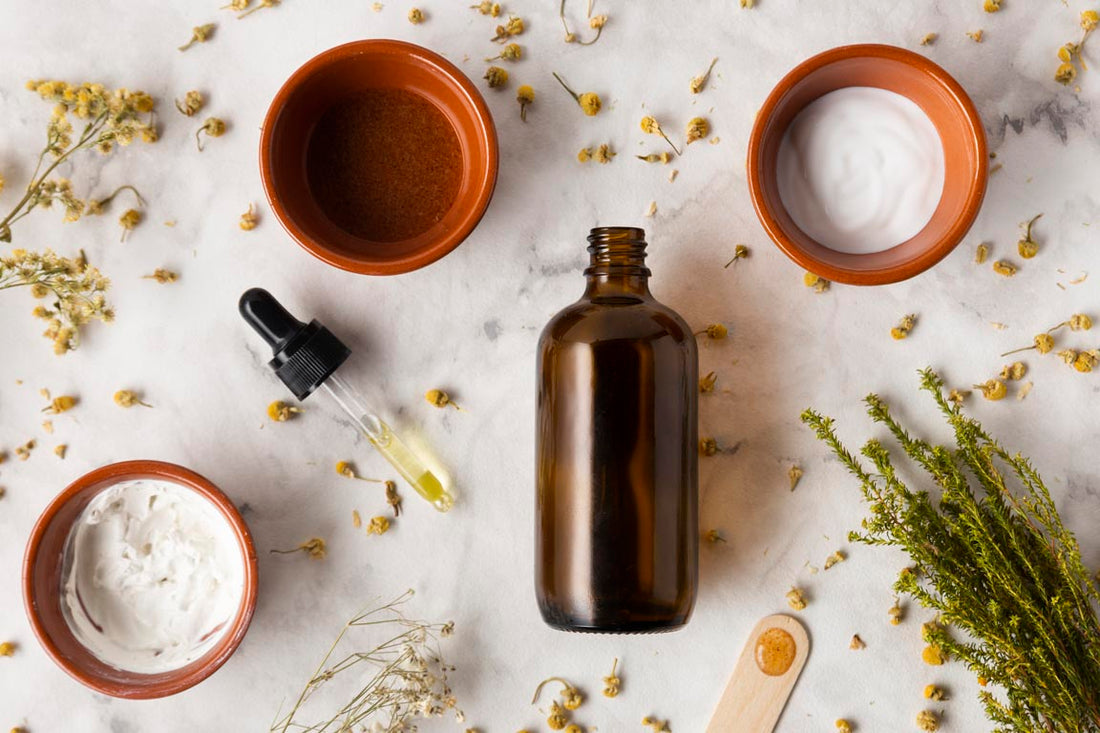Natural vs. Synthetic Ingredients: What’s Best for Mature Skin?

An important step in understanding skincare is to learn which ingredients work for you and which are good or bad for your skin. However, before determining “good” skincare from “bad,” you must first establish the main differences between natural and synthetic ingredients.
When it comes to natural vs. synthetic skincare, there are pros and cons to each, especially with their use in mature skincare regimen. We've broken down the differences to help you learn what to look for in products for your skincare routine. We’ve also detailed what to use and avoid when it comes to natural vs. synthetic skincare. Let's have a look!
Understanding the Key Difference Between Natural and Synthetic Ingredients in Skincare
In short, natural ingredients are derivatives of plants, animal by-products, and minerals. In comparison, synthetic ingredients are created in a lab.
Synthetic variants mimic the effects of their natural ingredient counterpart. They may even produce alternative effects that the natural ingredients cannot produce in skincare.
Whether you opt for natural or synthetic ingredients, each has its own disadvantages and advantages. Some people with mature skin prefer synthetic ingredients over natural or a combination of both.
Read more: Everything You Need to Know About Eye Wrinkles
What Are the Best Skincare Ingredients for Aging Skin? A Look at Natural
Natural ingredients can be a primary selling point of skincare products and a popular choice for many, as they are often gentle on the skin and offer other benefits. The best natural ingredients for skincare to consider are the following:
- Hyaluronic acid: This natural ingredient is extracted from plants and has excellent hydrating benefits with added moisture-retaining properties.
- Rosehip oil: Produced from the fruit of rose plants, this oil contains potent levels of vitamins A and C, which are uber essential for skin regeneration.
- Green tea extract: Various green tea extracts are the best source of antioxidants and anti-inflammatory properties. Green tea extracts help protect the skin and address the symptoms of aging.
- Aloe vera: This popular natural ingredient is known for its soothing and hydrating properties, which are ideal for dry and sensitive skin.
- Shea butter: Shea butter helps moisturize and create a protective barrier on your skin.
Read more: Power of Yerba Mate: Transform Your Skincare Routine
What Are the Best Ingredients for Aging Skin? A Look at Synthetic
When considering synthetic ingredients, it is important to remember that they are usually made to target specific skin issues or areas of concern. The main benefit of using synthetic ingredients in skin care products is that they offer a more stabilized formula and can provide consistent results. The best synthetic ingredients to consider in skincare products are:
- Retinoids: Retinoids are synthetic derivatives of vitamin A. This ingredient boosts cell turnover and stimulates collagen production in mature skin.
- Peptides: Peptides are synthetic proteins that improve mature skin elasticity and firmness and increase collagen production.
- Niacinamide: This ingredient is a synthetic variant of vitamin B3, known to improve the skin's barrier function and texture.
- Hyaluronic acid: While hyaluronic acid has natural derivatives, the synthetic variant is known to have a more effective formula.
- Ceramides: Ceramides are synthetic fats or lipids that aim to restore the skin’s barrier and retain moisture, which is particularly good for mature skin.
The Worst Ingredients for Mature Skin: Natural and Synthetic
While many ingredients — whether natural or synthetic — could benefit your skin health, there are a few that you should avoid. When it comes to mature skin skincare, try avoiding these specific ingredients in the sections below.
Natural Ingredients for Mature Skin to Avoid
- Alcohol: Alcohol is a harsh chemical on mature skin because it can strip away the natural oils that the skin needs.
- Essential oils: There are exceptions, such as citrus-based oils, that you can use, but most essential oils are too harsh or can cause irritation on the skin.
- Coconut oil: It is unsuitable for some because it often clogs pores, making acne and breakouts more frequent.
Read more: Yerba Mate: The Best Eye Cream Skincare Ingredient for Mature Skin
Synthetic Ingredients for Mature Skin to Avoid
- Parabens: Parabens are preservatives that are added to some products to increase their shelf life. However, they can cause health risks and irritation.
- Fragrances: Most, if not all, synthetically made fragrances are known to cause or aggravate sensitive and irritated skin.
- Sulfates: Found in many cleansers, sulfates are another ingredient that removeall-natural oils which protect the skin, leading to dryness and irritation.
Related post: Pregnancy Skincare
The Wrap-op on Natural vs. Synthetic Ingredients for Mature Skin
When choosing a product, it's important to note what your skin needs. For example, if you need a gentle product, opt for a natural-based product. However, if you need to target a specific area and want effective results, try using synthetic-based products. Hopefully, you now know which ingredients to avoid and which to try when looking for mature skincare products that help keep your skin healthy.
Shop our products:











